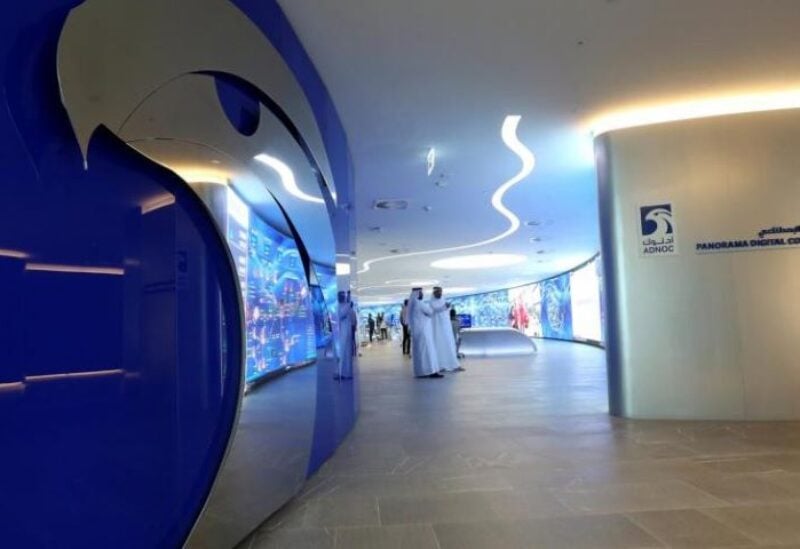
Adnoc headquarters Abu Dhabi
The board of the Abu Dhabi National Oil Company, chaired by Sheikh Mohamed bin Zayed Al Nahyan, Crown Prince of Abu Dhabi and Deputy Supreme Commander of the UAE Armed Forces, approved plans to spend Dh466 billion ($127 billion) between 2022 and 2026, with the state energy producer directing Dh160 billion to the local economy.
On Wednesday, Adnoc’s board of directors approved the company’s five-year business strategy, as well as a “substantial” increase in national reserves of 4 billion stock-tank barrels (STB) of oil and 16 trillion standard cubic feet of natural gas.
These new deposits bring the UAE’s total hydrocarbon reserves to 111 billion barrels of oil and 289 trillion cubic feet of natural gas, according to a statement issued by Adnoc after Sheikh Mohamed presided over the company’s board meeting.
The fresh finds have strengthened the country’s position as the world’s sixth-largest oil reserve holder and seventh-largest gas reserve holder. Sheikh Mohamed stated that the UAE would continue to responsibly unleash its hydrocarbon resources in order to promote progress and contribute to global energy security.
Murban-grade crude, Abu Dhabi’s lower-carbon crude grade that has been trading on the ICE Futures Abu Dhabi (IFAD) commodities exchange since March 2021, accounts for about half of the newly acquired 4 billion barrels of national oil reserves.
The new rise in national reserves follows Adnoc’s revelation last year of the finding of exploitable unconventional oil resources valued at 22 billion barrels, as well as a 2 billion barrel increase in conventional oil reserves. Adnoc declared 7 billion barrels of oil and 58 trillion scf of conventional gas reserve additions in 2019, as well as the finding of unconventional recoverable gas resources totaling 160 trillion scf.
Adnoc’s five-year business strategy will aid in the expansion of its upstream production capacity and downstream portfolio, as well as its low-carbon fuels business and renewable energy objectives.
Adnoc stated that the company’s ambitions to reinvest more than Dh160 billion in the UAE economy over the next five years through its ICV program will assist expand and diversify the economy, as well as promote the aims of the UAE’s “Principles of the 50.”
According to the firm, Adnoc has returned Dh105 billion to the UAE economy and generated over 3,000 employment for UAE citizens in the private sector since 2018, including 1,000-plus positions this year alone.
Adnoc’s board recently approved its “New Energies Strategy,” which aims to reduce the company’s carbon impact while also allowing it to capitalize on possibilities in renewable energy, hydrogen, and other low-carbon fuels.
“We have created a solid basis to guarantee Adnoc continues to deliver greater and more sustainable value for the UAE during the energy transition,” said Dr Sultan Al Jaber, Minister of Industry and Advanced Technology and Adnoc managing director and group CEO.
“As we build on this foundation, we are capitalizing on the numerous commercial possibilities that exist in this period while also enhancing our position as one of the world’s lowest-cost and lowest-carbon oil and gas producers.”
Adnoc intends to build a “hydrogen ecosystem” in order to fulfill rising worldwide demand for the lighter, cleaner gas that is emerging as a viable alternative to fossil fuels.
As part of the Emirates’ ongoing energy diversification efforts, Adnoc, Mubadala Investment Company, and ADQ formed an agreement in January to build a hydrogen economy in the UAE, focused on low-carbon green and blue hydrogen.
Adnoc is also collaborating with Abu Dhabi’s energy business Taqa to develop a worldwide renewable energy and green hydrogen enterprise with a capacity of 30 gigatonnes by 2030. The two businesses will collaborate on local and worldwide renewable energy and waste-to-energy initiatives, as well as green hydrogen generation, processing, and storage.
Hydrogen has grown in importance as a viable alternative fuel in several global economies as they assess its potential as a replacement for hydrocarbons. Hydrogen supporters and manufacturers are also working for ways to reduce the element’s carbon intensity, as it is currently created using enormous amounts of fossil fuel.
The UAE also intends to invest $160 billion over the next three decades to accelerate renewable energy production, with the goal of reaching carbon-neutrality by 2050. The UAE will also host Cop28 in 2023 as part of its efforts to lead the world in energy transformation.
Dr. Al Jaber described Adnoc’s business plan and new energy strategy as a “essential element in our continuous effort to future-proof our company model.”
“We are confident in our ability to achieve upstream growth, accelerate the UAE’s industrial development through downstream expansion, strengthen our trading skills, and expand our position in hydrogen and renewable energy,” he added.
At the same time, the firm is providing chances for the UAE’s private sector to profit from Adnoc’s expansion while also enabling more skilled employment opportunities for UAE national talent, according to Dr. Al Jaber.
As part of its 2030 plan, Adnoc intends to remain one of the lowest-cost producers and lowest-carbon emitters in the oil and gas business as it expands crude production capacity. It intends to attain the UAE’s gas self-sufficiency, increase its downstream sector, and enhance its trading capabilities.
The state oil producer plans to significantly increase its investment in hydrocarbons and will raise its output capacity to 5 million barrels per day by 2030.